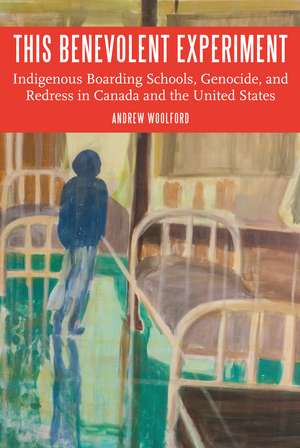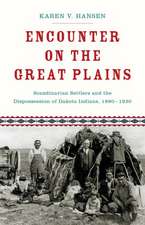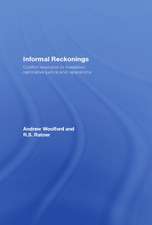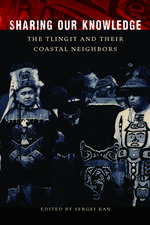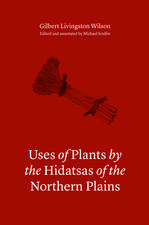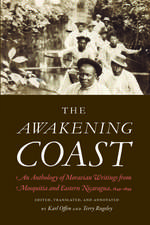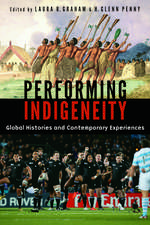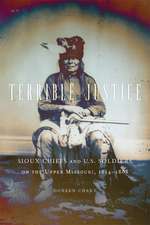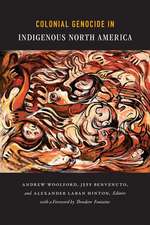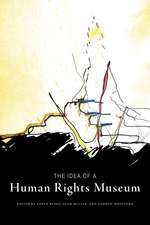This Benevolent Experiment: Indigenous Boarding Schools, Genocide, and Redress in Canada and the United States: Indigenous Education
Autor Andrew Woolforden Limba Engleză Hardback – sep 2015
A Choice Outstanding Academic Title, 2017
At the end of the nineteenth century, Indigenous boarding schools were touted as the means for solving the “Indian problem” in both the United States and Canada. With the goal of permanently transforming Indigenous young people into Europeanized colonial subjects, the schools were ultimately a means for eliminating Indigenous communities as obstacles to land acquisition, resource extraction, and nation-building. Andrew Woolford analyzes the formulation of the “Indian problem” as a policy concern in the United States and Canada and examines how the “solution” of Indigenous boarding schools was implemented in Manitoba and New Mexico through complex chains that included multiple government offices with a variety of staffs, Indigenous peoples, and even nonhuman actors such as poverty, disease, and space. The genocidal project inherent in these boarding schools, however, did not unfold in either nation without diversion, resistance, and unintended consequences.
Inspired by the signing of the 2007 Indian Residential School Settlement Agreement in Canada, which provided a truth and reconciliation commission and compensation for survivors of residential schools, This Benevolent Experiment offers a multilayered, comparative analysis of Indigenous boarding schools in the United States and Canada. Because of differing historical, political, and structural influences, the two countries have arrived at two very different responses to the harm caused by assimilative education.
At the end of the nineteenth century, Indigenous boarding schools were touted as the means for solving the “Indian problem” in both the United States and Canada. With the goal of permanently transforming Indigenous young people into Europeanized colonial subjects, the schools were ultimately a means for eliminating Indigenous communities as obstacles to land acquisition, resource extraction, and nation-building. Andrew Woolford analyzes the formulation of the “Indian problem” as a policy concern in the United States and Canada and examines how the “solution” of Indigenous boarding schools was implemented in Manitoba and New Mexico through complex chains that included multiple government offices with a variety of staffs, Indigenous peoples, and even nonhuman actors such as poverty, disease, and space. The genocidal project inherent in these boarding schools, however, did not unfold in either nation without diversion, resistance, and unintended consequences.
Inspired by the signing of the 2007 Indian Residential School Settlement Agreement in Canada, which provided a truth and reconciliation commission and compensation for survivors of residential schools, This Benevolent Experiment offers a multilayered, comparative analysis of Indigenous boarding schools in the United States and Canada. Because of differing historical, political, and structural influences, the two countries have arrived at two very different responses to the harm caused by assimilative education.
| Toate formatele și edițiile | Preț | Express |
|---|---|---|
| Paperback (1) | 298.80 lei 6-8 săpt. | |
| Nebraska – sep 2018 | 298.80 lei 6-8 săpt. | |
| Hardback (1) | 592.59 lei 6-8 săpt. | |
| Nebraska – sep 2015 | 592.59 lei 6-8 săpt. |
Preț: 592.59 lei
Preț vechi: 697.16 lei
-15% Nou
Puncte Express: 889
Preț estimativ în valută:
113.39€ • 118.69$ • 94.38£
113.39€ • 118.69$ • 94.38£
Carte tipărită la comandă
Livrare economică 31 martie-14 aprilie
Preluare comenzi: 021 569.72.76
Specificații
ISBN-13: 9780803276727
ISBN-10: 0803276729
Pagini: 448
Ilustrații: 12 photographs, 1 illustration, index
Dimensiuni: 152 x 229 x 35 mm
Greutate: 0.81 kg
Editura: Nebraska
Colecția University of Nebraska Press
Seria Indigenous Education
Locul publicării:United States
ISBN-10: 0803276729
Pagini: 448
Ilustrații: 12 photographs, 1 illustration, index
Dimensiuni: 152 x 229 x 35 mm
Greutate: 0.81 kg
Editura: Nebraska
Colecția University of Nebraska Press
Seria Indigenous Education
Locul publicării:United States
Notă biografică
Andrew Woolford is a professor of sociology and criminology at the University of Manitoba and a recipient of a Fulbright Scholar Award. He is the author of Between Justice and Certainty: Treaty-Making in British Columbia and the coeditor of Colonial Genocide in Indigenous North America.
Cuprins
List of Illustrations
Preface
1. Introduction
2. Settler Colonial Genocide in North America
3. Framing the Indian as a Problem
4. Schools, Staff, Parents, Communities, and Students
5. Discipline and Desire as Assimilative Techniques
6. Knowledge and Violence as Assimilative Techniques
7. Local Actors and Assimilation
8. Aftermaths and Redress
9. Conclusion
Notes
References
Index
Recenzii
"[This Benevolent Experiment] is well written, intelligently organized, meticulously researched, and offers original content. Woolford provides an important addition to the growing and rich literature about American Indian genocide and boarding schools."—Clifford E. Trafzer, American Historical Review
"This Benevolent Experiment is a must-read for the experts and students of North American history and Native Americans alike."—Arif Jamal, Washington Book Review
"This important book, which students, scholars, and policy makers in the U.S. and Canada should read, is a testament to the quality of the work and the still limited understanding of its subject in both countries."—C. R. King, CHOICE
"Andrew Woolford's contribution to the field of residential school studies is fascinating. . . . This important work deserves to be read and debated in both countries."—Jim Mochoruk, South Dakota State Historical Society
"[This Benevolent Experiment] is a genuine contribution to the literature and will remain for years to come a major source for understanding this tragic, but nonetheless fascinating, chapter in indigenous-colonial settler relations."—David Wallace Adams, American Indian Culture and Research Journal
"Scholars of indigenous boarding schools will find Woolford's book a valuable tool in analyzing and describing the destructive power of these institutions."—John Gram, Western Historical Quarterly
"An excellent offering for scholars."—Roundup Magazine
"This Benevolent Experiment is a welcome contribution for scholars in the fields of education, Indigenous Studies, and genocide studies. It is also an important text for mainstream society because it sheds light on not only the terrible history of Indigenous boarding schools in North America, but also the consequences of them, and how that legacy exists in the present."—Kyle T. Mays, Canadian Journal of History
"This Benevolent Experiment pushes students and scholars of indigenous education to deal more directly with genocide, which is a significant challenge to a field that has engaged the concept somewhat ambivalently. This in itself is quite an accomplishment, and Woolford's work deserves consideration from scholars, graduate students, and undergraduates alike."—Kevin Whalen, Pacific Historical Review
“Andrew Woolford’s outstanding book offers fresh contributions to the field of Indigenous and settler colonial studies. His comparison of the Indian boarding schools in the United States with their Canadian counterparts yields new insights into both. He provides a sophisticated and probing analysis of whether these schools constituted genocidal policies and practices. This is a top-notch piece of scholarship that should enrich our scholarly—and national—debates for decades to come.”—Margaret Jacobs, author of White Mother to a Dark Race and A Generation Removed
